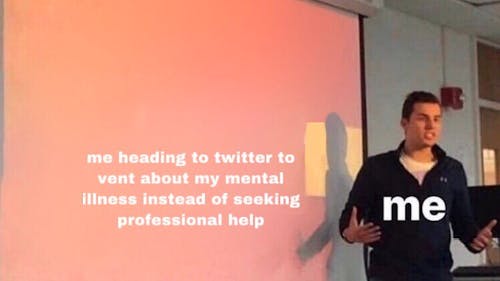Memes continue to push mental illness into full focus

If you’re scrolling through Instagram or Twitter it’s almost impossible to not stumble upon a meme or two. But the memes found on Instagram today are nowhere near the wholesome, or at least less serious, memes that dominated our feeds back in 2012.
Memes seem to only get darker and more sardonic as time goes on, with the abundance of Instagram pages devoted strictly to dark humor acting as proof that their millions of followers find something relatable and intriguing about that dark humor. It seems that although cute cartoons with captions embedded in them were once just entertainment, today they have taken on a whole new repertoire. Today, memes, alongside entertainment, are used almost as a coping mechanism for our generation.
It’s not just memes — humor in general has always given people a space and a place to talk about serious issues in a way that isn’t as stigmatized and heavy as the issue at hand. From poverty to death to mental health — humor is the common denominator that has helped many people cope with these subjects.
Every generation has had its fair share of laughs and its preferred mediums to laugh at. In the 90s it was Saturday Night Live (SNL), sketch comedy and stand-up. But this generation — we laugh and cope with concerning dark memes that aren’t really jokes, but truthful.
When they’re analyzed, memes reveal that they aren’t really jokes at all — they’re entirely truthful, dark honesty, where the joke lies in the transparency of anguish.
Furthermore, writer Konrad Krawczyk believes that memes are just as therapeutic as they are dark. “Internet meme culture has contributed to opening up an honest conversation around mental health. This can potentially lead to a better awareness and network of support — one that the preceding generations could not afford to create,” according to his piece on Medium.
Krawczyk explains that memes are dark because “in order to be funny, your content needs to be surprising.” He continues by saying that the need for a shock factor leads to content “bordering on risky and inappropriate.” He adds that comedy is not a positive, happy-go-lucky place — it’s dark and “thrives on negativity, pain and self-deprecation.”
Memes that revolve around self deprecation and mental illness are not only relatable, but are looked upon favorably, by a generation of people that are facing a “mental health epidemic.” Mental health has always been stigmatized and still is, regardless of how many shows and documentaries that are made about it.
Talking about mental health, or the struggles one faces, is hard and uncomfortable. On top of this, going to therapy is almost an impossibility for many people due to its high prices. For many people, memes are the perfect alternative. They’re simple, available and give people the sense of solidarity.
Manny Ramirez, a School of Arts and Sciences senior, says that dark memes fit his humor to a tee. “I would say some memes are therapeutic for some people” he said. “Sad boy memes and sad girl memes are relatable to a lot of guys and girls. I think it helps us share our feelings with others behind the safety of a screen. Knowing someone else has the same experience as us helps us cope.”
He’s right — our generation has turned to the internet to cope, it’s what we have been doing our whole lives. Younger generations were raised on technology and the internet so there’s no surprise that it’s where we go for all our life questions and issues — it’s second nature.
It’s no secret that humor is a way for one to smile and get through tough times. It’s cliché, but true: laughter is the best medicine. It seems that no matter how far from a joke a cynical, dark meme may seem, the sheer fact that it’s true and relatable is funny. The millions of likes these memes get make one feel like they aren’t alone in struggling with a mental illness or in life in general.
In addition, it allows one to tackle an issue prevalent in their lives in a safe and comfortable place. Memes have started a conversation about, and ripped the Band-Aid off of, a topic that is still very much stigmatized today. While memes can’t replace therapy, it’s a comfort and a starting point for a lot of people.



